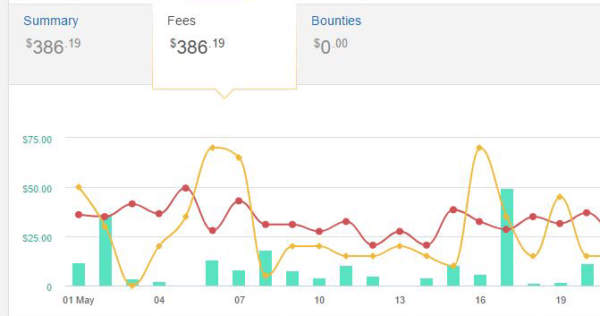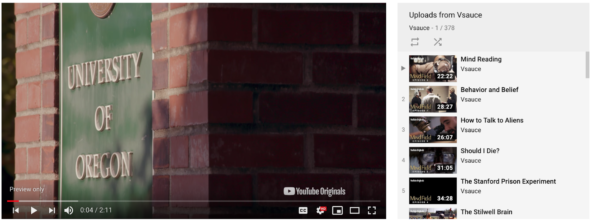Let me guess:
You love creating content. You’re creatively fulfilled to share your thoughts and feelings with netizens. And you like how your audience showers love and appreciation for you.
Here are a couple of disturbing stats though:
- Even if you get a million views a month on YouTube, you might still not be able to make rent,
- If you make a few hundred dollars a month through your blog, then you’re already an outlier.
Ouch.
If you’re writing or creating content as a leisure activity, then you’re cool, and the habits in the article are not essential for you.
If you want your content to help pay your bills (including for new brands that are starting content marketing), then these five habits can boost your progress. As you may know, being a successful content creator involves more than just writing. Here are the habits that can lead to developing these skills.
1. You have a detailed target audience in mind
Great content creation is about serving an audience. It’s about addressing their pain points and solving their problems. Aaron Orendorff, a top B2B copywriter, believes that every piece of content you write should “rescue your audience from their own personal hell.” Here are the two things he considers great copywriting should encompass –
Note that the size of the audience (especially at the beginning) need not touch a million. Or even a hundred thousand members.
As writer Tim Ferriss recommends in the video below, it’s about finding your narrow niche and building a tribe of people that absolutely LOVE your content. It could simply mean as many as “1,000 true fans” that are super connected with everything you create. They alone can sustain your creative career.
Later on, your superfans might act as your unpaid marketing force and expand your audience to your casual followers. If you look around most successful bands of all time, you’ll almost always be able to credit a huge chunk of their success to such “true” fans.
For the metal band Slipknot (serving a niche market), it’s “Maggots” (you’re reading an article by one right now)! Justin Bieber also has his set of “Beliebers.”
The actionables for you are: writing and creating content while always keeping a detailed avatar of “who this content is for” in your mind. If you don’t already have an audience profile, then start with these aspects:
Age:
Gender:
Location:
Interests:
Problems:
You can also create a detailed audience persona by answering a few questions inside the Make My Persona Tool by HubSpot. When creating content, you focus on keeping your content relevant to your audience above.
2. You are authentic and have a unique voice
Wait But Why is a well-known blog with long-form, insightful content laden with stick figure illustrations (an example below) and funny prose. The author, Tim Urban, has developed such a unique and engaging voice on his blog that he has built it to over a million visitors per month.
Tim doesn’t even focus on a niche – it’s a blog about everything. Further, he doesn’t publish regularly, only “every sometimes.” And Tim’s audience LOVES him. They are often angry if he hasn’t posted new content in a while.
Do you know that 4 million blog posts published every day and hundreds of hours of video uploaded on YouTube every minute?
To stand out in the sea of content, you need to:
- create the best piece of content on the internet on your chosen subject,
- covering the subject your way i.e. staying authentic and using your own voice.
Now, for starters, finding your voice involves reading a LOT by other writers that you like for inspiration. Also, writing a lot of content to see what fits and works well with your audience. For ensuring consistency in writing, you can begin with designing a style guide. I drafted one for The Ecommerce Academy (T.E.A.) before we kicked off our content calendar.
If you’re a video content creator, then you have even more space to showcase your personality and grab the attention of your audience. Watch Gary Vee in his might on YouTube. He is often over the top and swears, but he inspires “to get shit done.”
3. You focus on achieving goals (KPIs) through your content
Have you ever been fascinated by the image of a starving artist?
The romantic idea that to create ‘true’ art, you need to wait for your chance. You need to create solely for yourself and live the life of poverty.
Well, I had fallen in love with this image, and I see too many creatives around me worship financial struggle.
Time’s up, people! The image of a starving artist is a myth.
You know what you need to build a sustainable and thriving content creation career?
You need to have a serving mindset. Create while keeping your audience in mind and they will happily help you pay the bills at the end of every month. The way to achieve the same is by associating key performance indicators (KPIs) with your content. A few of these include:
- Traffic/Video views
- Social media shares
- Email signups/YouTube subscribers generated per video
Largely, all of these might turn into vanity metrics. Hence, try to come up with KPIs that directly affect your bottom line. Remember that only conversions can sustain a creative business like yours.
Once you have metrics handy, you can actively choose the high-order activities that matter right now for your business.
It could mean that:
- You update older pieces of content instead of creating new content pieces.
Why?
Since it provides a higher ROI on your time spent (it’s indeed become a vital blogging strategy to update older content).
- You allocate time to syndicate and distribute your content instead of writing new pieces as it helps you recruit new audience members.
The takeaway for you? Choose your KPIs and prioritize what’s important every work day.
4. You create content regularly
In 2015, a HubSpot report said that companies that publish 16+ blog posts per month get almost 3.5x as much more traffic as the ones that publish 0-4 blog posts.
It’s recommended to upload least one video per week even on YouTube. And a higher frequency can supercharge your channel’s growth.
Creating and publishing regularly sets audience expectations to check out your content at set intervals. Further, it puts you in the habit of shipping, being open to feedback, and honing your creative skill.
The actionable takeaway is to put dates on calendar and respect deadlines (they aren’t suggestions, aye?) You can use a free project management software like Trello for the same. At Graphic Rhythm Designs, we use Asana. Look at our editorial calendar below.
While publishing MORE might help your growth, don’t bite off more than you can chew. Substandard content that turns off your audience will only hurt your business. Your focus should be to stay consistent at a frequency where you can deliver high-quality content.
Remember that if you ALWAYS publish AMAZING content, then your audience won’t mind waiting. Look at the likes of Brian Dean from Backlinko (he built a million dollar business by merely publishing around 60 blog posts). And Michael has only uploaded 378 videos (including his paid content) on YouTube since launching Vsauce in 2010. He has snagged 14M subscribers at a frequency of less than one video per week.
Pro Tip: If you’re the kind of person that gets content ideas on the go, then you can also use an app like Workflowy/Evernote to capture them. Else, you can also archive your ideas in a notebook.
5. Leverage data to inform your content creation efforts
Would you prefer 100 views over 10 views putting in the same amount of effort in creation?
Well, then you simply need to perform keyword research to accommodate your content ideas in the language preferred by the users. It involves finding the phrases used by people interested in reading/watching your content. Hence, you can expand your reach by using the language of your audience.
If you’re a blogger, refer my detailed guide on performing intent-based keyword research. If you’re a YouTuber, then watch this 21-minute extensive guide on YouTube keyword research.
Another practical aspect of data is doubling down on the kind of content that fares well with your audience. It’s an asset whose value can increase over time. You can use the popularity of such pieces to amplify your reach. Did I forget to mention that creating such pieces is often easier?
For example, when Mark Schaefer saw his article on content shock go viral, he created follow-up pieces on strategies to battle it and a parable post. Both of them fared decently.
On YouTube, the algorithm calls for creating videos that keep the user engaged and retain them on their platform. Hence, it’s useful to create “clusters of video content” that you can mutually link and promote. Sean Cannell, a YouTube expert, relies on the strategy.
The actionable takeaway for you is to regularly (maybe, every week?) check your Google Analytics and YouTube Analytics reports. Look out for the content pieces that resonate with your audience (generally speaking, engagement metrics should take preference over the vanity of views on your content). Then, create future content pieces with the intel of “what’s working with your visitors.”
Conclusion
Here’s how leading blogger and author, James Clear, defines habits: “Habits are the small decisions you make and actions you perform every day. According to researchers at Duke University, habits account for about 40 percent of our behaviors on any given day.”
I have shown you around five such habits and hope that you find them valuable. Start with integrating one of these habits in your work routine. I would love to see you go onwards and upwards in your content creation efforts!
What do you reckon are the habits of successful content creators? Let me know in the comments.
The article originally appeared at Graphic Rhythm Designs.







